Ricochet is the best place on the internet to discuss the issues of the day, either through commenting on posts or writing your own for our active and dynamic community in a fully moderated environment. In addition, the Ricochet Audio Network offers over 50 original podcasts with new episodes released every day.
 Laissez-faire SCUBA (Part 2): Regulators Without Regulations
Laissez-faire SCUBA (Part 2): Regulators Without Regulations
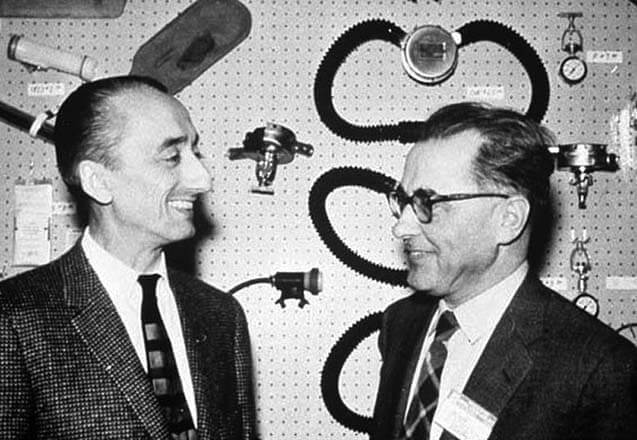
Jacques-Yves Cousteau and Emile Gagnan designed and tested the first Aqua-Lung.
You can read Part 1 of the Laissez-faire SCUBA series here.
SCUBA diving is one of the rare industries to avoid government interference. And, in so doing, it thrived while while creating exceptional safety standards. The unique history of SCUBA shows us how.
The first modern demand regulator was invented by Jacques Cousteau and Emile Gagnon in 1943. This device allows a diver to draw air from a compressed tank and expel the used air into the water. The key innovation was a pressure valve that automatically compensated for water pressure, allowing the diver to breathe naturally from a tank containing 3000 PSI of air, regardless of water depth.
Before the modern demand regulator was invented, divers used “rebreathers” which scrubbed CO2 out of the exhaled air and recirculated it. This required extreme care and was dangerous and not suited for recreational divers. Divers also used helmets and suits with weighted boots, but these required a team of support people and a boat and was uncomfortable and dangerous. The modern regulator and air tank freed divers from hoses and rebreathers and opened up diving to millions. Cousteau called the invention the “Aqua-lung.”
The aqualung was invented in France during World War II. The government had other things on its mind and in that era it was still possible for a couple of tinkerers to make a product and sell it without interference. A patent was granted, and after the war Cousteau and Gagnon formed a company to sell the equipment around the world.
In the aftermath of WWII, there was little government oversight of this kind of activity, and the small size of the initial market helped the new sport fly under the radar of government interference. Small manufacturers with innovative designs sprung up in countries like Great Britain, Australia, and the United States. The international nature of the sport meant that no single government had jurisdiction.
In the early days of SCUBA, there were no standards, no regulatory bodies, no formal training regimes. There was no modern tourist dive industry with dive guides and instructors on hand to protect people from foolish decisions. If you wanted to dive, you acquired some equipment and a boat and you taught yourself how or tried to learn from someone else who had done it. This was a dangerous way to learn, and in the earliest days of the sport the number of injuries and fatalities were proportionally quite high.
Ironically, this lack of inherent safety may be one of the reasons SCUBA diving escaped the eye of government – the industry realized that safety was a major limiting factor in growing their market, and the manufacturers and enthusiasts recognized the need for standards and training long before governments began paying attention.
At this time, the dive industry was very small – by 1950 only ten SCUBA sets had been sold in the USA. It was still too small to attract the attention of politicians or anyone other than the divers and manufacturers themselves, and they were already hard at work on improving safety. The ‘buddy’ system was developed during this time, and equipment continued to improve. Ex-Navy frogmen from WWII sometimes found work training people to dive or running small dive operations, but it was all ad-hoc and much experimentation was going on.
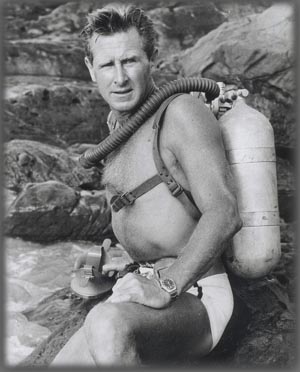
Lloyd Bridges in “Sea Hunt,” long before he stopped drinking coffee and sniffing glue.
In 1957, a new TV show called “Sea Hunt” starring Lloyd Bridges caused a burst in public interest in SCUBA diving.
Thousands of people began flooding into the sport, but by then there were already a number of professional dive instructors available. In 1959 the YMCA opened up the first national diving certification program. The industry was still staying ahead of the government.
Despite the availability of instructors and training programs, many people continued to dive without first learning how. The number of injuries and fatalities continued to climb as more people joined the sport. This would normally be the time when government hearings would take place and regulations created, but jurisdictional issues and practical enforcement concerns stopped this from happening. Dive equipment was manufactured around the world, and diving itself often took place on far-away islands where the major governments could not reach.
Nevertheless, it’s almost certain that eventually government would have entered the fray. After all, it almost always does. But the dive industry stayed one step ahead. In 1960, the National Association of Underwater Instructors (NAUI) was formed. Using U.S. Navy dive tables and training procedures, they created the first international body to ensure training standards and to issue internationally recognized certification cards for qualified divers. Dive operators looking to reduce their liability exposure began to require NAUI training as a condition of rental or having your air tanks filled.
NAUI was quickly joined by PADI, the Professional Association of Dive Instructors. Between the two organizations a comprehensive and thorough worldwide dive training system came into being. By the end of the decade, certification of training was required across the globe to be able to rent dive gear or recharge a SCUBA tank. It was still legal to dive without the training but you would have to buy your own equipment and air compressor, and even then no dive operator would take you on a charter without the card.
In 1980, the Diver’s Alert Network (DAN) was formed. This organization provided dive insurance and acted as a clearinghouse for safety-related dive information – including information on reputable dive operators. As an insurer, DAN had a vested interest in promoting safe diving and divers paid serious attention to their safety bulletins and alerts. Dive operators had to meet high standards to qualify for DAN certification for their operation, and in an unregulated market such certifications are necessary for customer acceptance.
Where Are We Now?
Here’s what a free market for safety looks like in action: Diver’s Alert Network Fatality Workshop. When there is a diving fatality, DAN makes sure everyone knows what happened, and why. Each year, they workshop the year’s incidents and produce reports and recommendations which are fed back into the training network, given to physicians, and in the case of equipment trouble provided to manufacturers (and reported to the diving public, giving the manufacturer a large incentive to fix the problem immediately.)
Today, DAN, NAUI, PADI, and the other private organizations have evolved into a general oversight role for the entire industry. Have a look at these beach shack dive operations:
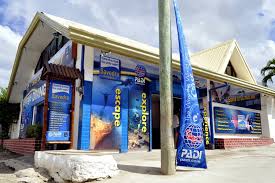
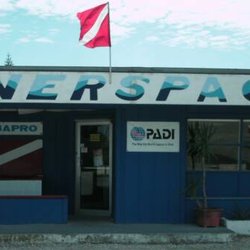
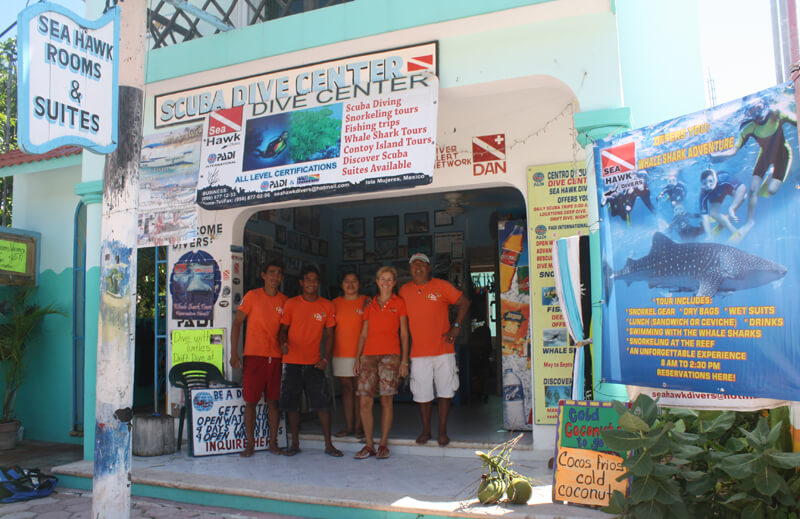
Notice anything? They are festooned with prominent signs showing their PADI, NAUI, and DAN certifications. A dive operator who is certified by these agencies gets promoted on their websites and may be used as a service provider by cruise lines and travel agents. Not having that certification basically means losing the tourist trade and having your business close. This is a much more powerful regulatory force than a government fine, or paying to buy off a government inspector – a more likely prospect in some third-world tourist destinations if government were left to determine safety conditions.
The certification requirements have also adapted as the market changed. The early NAUI training system was largely derived from military diver training programs, and it was difficult. I received my NAUI certification in 1980, and we had a number of “‘wash-outs” in the course due to the physical demands. This level of training was appropriate for the early industry where most diving was done without divemasters or instructors or in controlled settings.
Over time the industry changed, and diving became an activity primarily done in groups in controlled shallow-water situations with a commercial divemaster along to keep people safe. New certification categories were created for divers who restricted themselves to such resort dives, opening up the market to more people gradually and safely. This is very different than the one-size-fits-all type of regulation often imposed by government. The private market certification process was dynamic and ready to change with the times.
To supplement the large certification organizations, the SCUBA industry has also evolved a number of advisory committees around the world, and they all work together. Here are a few of them:
- CMAS – Confédération Mondiale des Activités Subaquatiques
- EUF – European Underwater Federation
- WRSTC – World Recreational Scuba Training Council
- IDSSC – International Diving Safety Standards Commission
None of these are government agencies. They are private operations that have linked together to form a global system of standards for safety, training, and diving operations.
This is real internationalism the way it should be. People around the world cooperating, sharing ideas, and working towards a common goal. It works because they are doing so willingly to promote something they truly care about. This is how different cultures get along when they are left alone to organize around common interests. Dive operators in the Middle East work closely with American, Mexican, Cuban, and European dive operators. People get along when their interests align and politics are left out of the mix.
Since 1980, there has been an explosion of innovation and a reduction in the cost of dive equipment. We now have special gas mixes that allow us to dive deeper, dive computers to manage decompression, and many other highly specialized, highly technical pieces of gear. None of it regulated by government. Over that period of time, safety has improved even more.
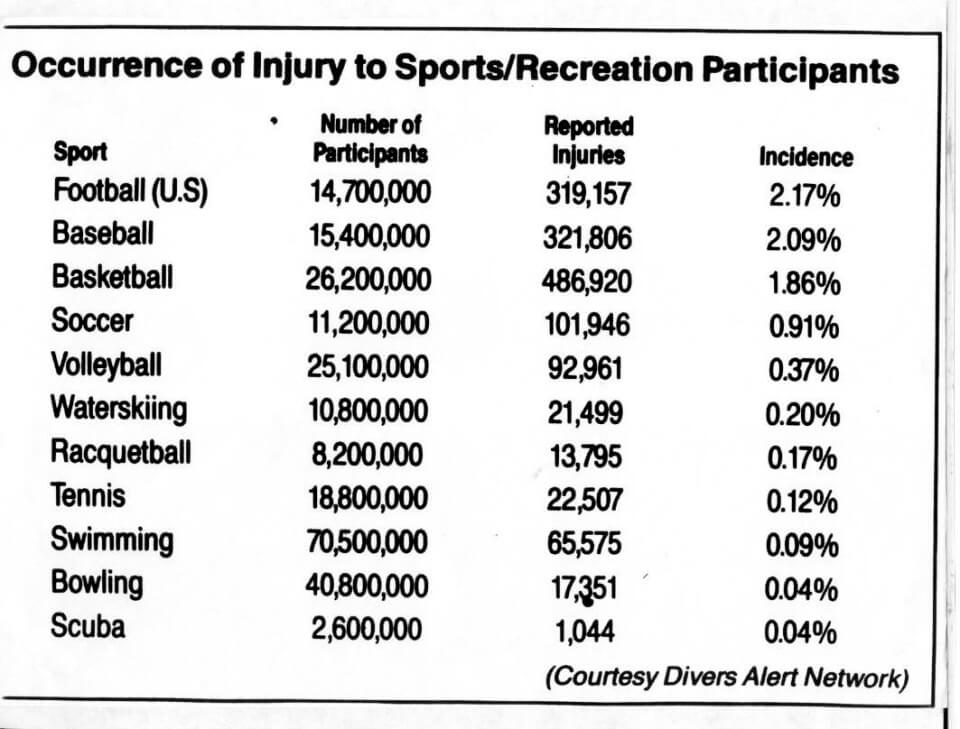 Here’s a chart showing the number of injuries attributable to various sports. You may note that diving has fewer injuries per person than “safe” sports like tennis, bowling, soccer, or swimming. Worldwide, there are less than 100 fatalities per year from diving despite millions of dives being done annually. Truly a spectacular achievement, especially considering the hostile environment divers put themselves into. And this is why governments are still not getting involved – they can’t hope to match the safety achievements that the free market managed all on its own.
Here’s a chart showing the number of injuries attributable to various sports. You may note that diving has fewer injuries per person than “safe” sports like tennis, bowling, soccer, or swimming. Worldwide, there are less than 100 fatalities per year from diving despite millions of dives being done annually. Truly a spectacular achievement, especially considering the hostile environment divers put themselves into. And this is why governments are still not getting involved – they can’t hope to match the safety achievements that the free market managed all on its own.
And what about those non-technical people who wouldn’t know a good regulator from a bad one? They’re protected by buying brand names like ScubaPro or Cressi Sub. They’re protected because dive shops won’t stock bad merchandise for fear of losing their affiliations with safety organizations. They are protected by organizations like DAN and magazines like DIVER which test gear and publish reviews. And, because they need professional training and certification, they are given equipment advice and told what to look for as part of their training.
So that’s where we are today. In an industry governed by a free market and with serious safety requirements, everyone watches everyone else’s back. If a dive operator cuts corners, cruise lines and travel agents will stop providing customers. If a manufacturer makes shoddy equipment, scathing reviews will destroy them because divers pay attention. If a diver tries to “go it alone” without training he’ll find that no one will help him, sell to him, or fill his tanks.
Without a government guaranteeing minimum safety standards, safety becomes everyone’s concern. Consumers pay more attention. Magazines that review products and operations find a larger market. Insurance agencies with unlimited downside risk work hard to set standards and develop safety tests. If standards and training are necessary for safety, and safety is necessary for a market to thrive, the market will evolve the appropriate mechanisms in its own defense.
Ultimately, what we have is an evolved system of checks and balances – of capitalist desires for profit driving good behavior. The rational need for safety and quality drives the emergence of private authorities and agencies to act as guarantors of quality. This is what markets do. They evolve, adapt, and meet the needs of the customer.
Tomorrow, I’ll compare the laissez-faire success of SCUBA with another industry in which regulations gutted innovation.
Laissez-faire SCUBA (Part 1): How an Unregulated Industry Triumphed
Laissez-faire SCUBA (Part 3): Coming Up for Air
Published in General




An excellent post, well-argued and presented. Thanks!
Someone should turn this essay into an infographic.
A real interesting history and your point is undeniable.
Great series. We’ve got to get better at educating the public – maybe take a page or two from the Progressive playbook.
Only one snag, here, tho. Elizabeth Warren may see this. She’d storm in and with lead boots and BHO’s mighty pen, destroy a perfectly working market system (world-wide, no less).
That is what I was wondering. Would a Leftist politician see this and think, “Hey, maybe self-regulation can work” or “Hey, I just found an industry we forgot to regulate. I propose you send me on a two week fact-finding mission in the Keys.”
Thanks for the nice comments, everyone.
I think SCUBA is safe for now, but in the current environment it would probably only take one major tragedy to start the calls for the government to ‘do something’. However, I think the industry has inoculated itself pretty well by being so proactive about safety. It’s hard to imagine a government program that could achieve a better result.
More interesting is to imagine what would be different had the SCUBA industry started today with our more activist vision of government. I think it would be very quickly regulated and controlled, and we would never see the kind of innovation and dynamism that the industry has maintained for the past 60 years.
Great stuff Dan, I’ve enjoyed them very much.
The bit that seems to resonate with people — at least those I engage with — is that first person. Guy takes a chance, trusts a dodgy dive company and ends up in trouble, bad gear, bad dive masters what have you and dies. Sure, word gets out and that dive company perishes from market forces but that doesn’t help the first “victim”.
I’m okay with it — as I’m sure are most of the Ricochetti — because I tend to be the type to do my research and think things through. I wouldn’t trust myself or my familiars with a dodgy operator but others are looking for a deal or are just hapless. This makes for nice anecdotes that resonate with people and help sell some level of government control.
In reading your articles I’m fascinated by why this hasn’t happened in the dive industry yet.
As an aside, it seems like most of the people I bump into in diving companies are odd ducks, flighty, carefree and seemingly irresponsible. The sort of people you might question in another context but it becomes evident really quickly that they are dialed in on the dive stuff. It’s awesome. Every time I meet one of them I’m ready to quit my job and become a dive master.
The point those other people miss is that lack of government regulation does not mean lack of regulation. The dive industry is highly regulated. Just not by governments.
Let’s look at how the two differ:
In a government regulated system, a dive operator applies for a license. Perhaps a government inspector comes in and inspects his operation, lays down rules such as only selling government-certified equipment, demands that all his customers have government-issued licenses, etc. His insurance company insures him on the grounds that his insurance will be void if the government deems he’s in violation of the law.
So now the operator has a checklist – do this, do that, and safety is taken care of. The customer has a checklist – if he has a government certification, he’s good. The manufacturers have a checklist – if they meet manufacturing rules A, B, C, they will be determined to be ‘certified’ and will meet the same safety standards as everyone else.
In the system we have now:
A dive operator opens a store. No customers come. How come? Because customers won’t deal with a dive operator who is not certified by DAN or NAUI or PADI. Cruise lines won’t send him customers. Travel agents won’t book with him. He tries to get insurance, but the insurers demand he be certified by one of these governing authorities. So, he goes to seek out certification. That puts all kinds of rules on his behavior, just like government did.
Under both systems it’s possible for there to be dive operators and manufacturers who want to break the rules. After all, the existence of laws against for clean restaurants doesn’t stop some restaurants from being shut down because they violate them. There will always be bad actors, people trying to save a buck by cutting corners, etc.
The question is not whether an industry should have safety standards or not, the question is which system is better at incentivizing those kinds of people to stay on the straight and narrow? Which one is better able to adapt to changing markets and changing technologies? Which system is easier to game? Which one is more transparent and responsive to criticisms?
In all those cases, the dive industry has proven that, at least in its case, private means of regulating behavior (and yes, spontaneous order) are a much better solution – not just for industry profits, but as a means of protecting individual consumers.
I might write another post soon showing how this actually applies to ALL industries. Spontaneous order and self-regulation are the norm in a free market economy, and most transactions are constrained not by government, but by the order imposed by the market.
Well stated.